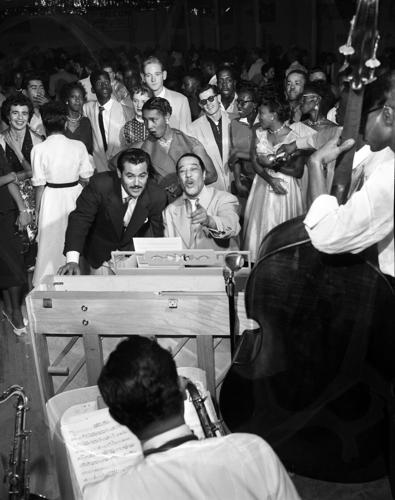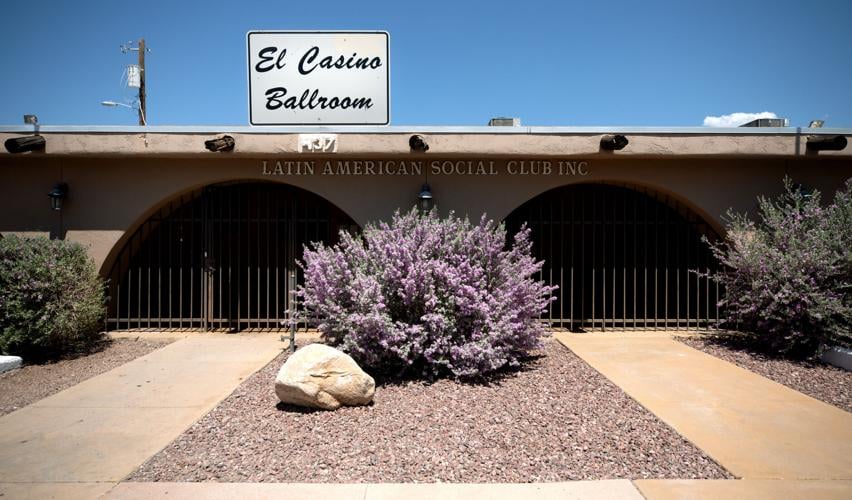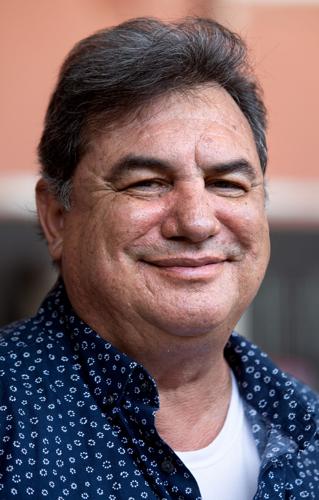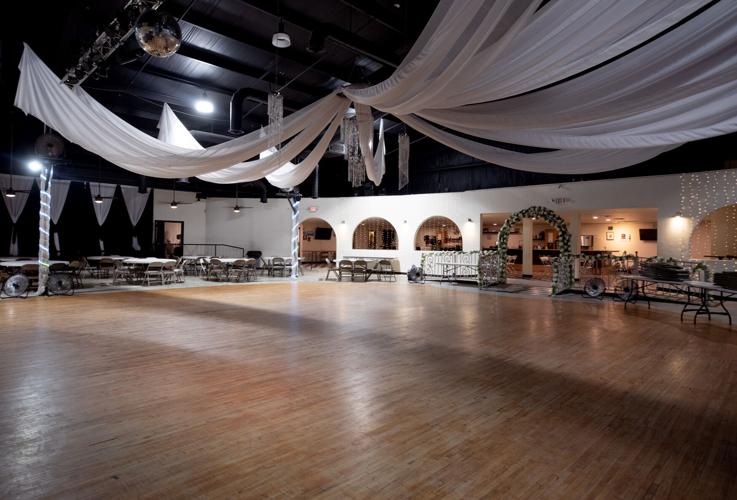It is a place where generations of Tucson Latinos have marked milestones, from quinceañeras and weddings to anniversaries and celebrations of life.
But El Casino Ballroom, 437 E. 26th St., is much more than all-purpose events center.
Since it opened in 1947, it has been the heartbeat of the greater Tucson Latino community, a place where politicians court voters and tatas watch their little granddaughters in colorful mariachi dresses perform recitals. Young and old alike gathered on Sunday afternoons for tardeads, dances that stretched into the evenings that the Silhouettes still host, and high school sports teams turn slow weekdays into boisterous celebrations with end-of-season banquets.
“El Casino was a place that everybody, no matter what age you were, … it was something that you grew up with,” said Dan Eckstrom, a South Tucson native who represented the city in county and local politics for 32 years.
“A lot of people judge it from outside rather than the inside,” said Rey Garcia, El Casino’s longtime head of security and a board member of the Latin American Social Club that has governed the ballroom since its inception.
“Inside the building, you feel like you’re at home,” Garcia said.

Little Joe of Little Joe, Johnny and la Familia performs at El Casino Ballroom at 437 East 26th St. in Tucson on July 29, 1979.
This weekend, El Casino Ballroom celebrates its 75th anniversary with two days of concerts and performances from dance troupes and bands that have played a part in the ballroom’s storied history.
The two-day celebration Saturday and Sunday, Sept. 9-10, features salsa and folklorico dancers, dancers from Viva Performing Arts and Arizona Folk Dance Company, mariachi groups including from Pueblo and Sunnyside high schools, and a number of bands including J5, Ritmo de Sanchez, Conjunto Bravo and Los Hermanos Cuatro. (For the full lineup, visit facebook.com/elcasinoballroom.)
The anniversary was actually last year, but the COVID-19 pandemic set them back, said Fred Martinez, who has managed the 1,200-capacity venue since 1995. El Casino was closed for more than a year during the pandemic and when they reopened in 2022, “we were barely getting back on our feet,” he said.
The COVID closure was the longest since El Casino was forced to close for nine years after a fierce wind storm tore the roof off the building in 1991. It took Martinez and groups of community volunteers countless hours outside of day jobs and busy careers to rebuild, replacing the roof and restoring the historic wooden dance floor which at one time was the longest wooden dance floor in Arizona.

Fred Martinez, manager of El Casino Ballroom at 437 E 26th St., in Tucson, Ariz. on Aug. 30.
“The dance floor was huge because people just loved dancing,” said Martinez, who took over the venue from his father Raul “Butch” Martinez, who managed El Casino from late 1960s.
Back in the early days, El Casino was one of the largest venues in Tucson and one of the few in the 1950s-60s that didn’t practice racial segregation. Hispanic residents from South Tucson and Tucson’s south side and African-Americans from the predominantly Black neighborhoods along South Park Avenue found a safe space there , which brought in big-name artists including Chubby Checker, Fats Domino, James Brown and The Ronettes. Audiences also packed in for shows that with some of the biggest Latino groups of the day including Little Joe, Johnny and la Familia, Sunny & the Sunliners, Los Tigres del Norte, Celia Cruz and Ray Camacho, and big bands led by national band leaders including Duke Ellington and Tommy Dorsey.
“There was no community center back then, until they built the TCC in 1970,” Martinez said. “Before then, a lot of the huge acts used to come to El Casino Ballroom.”
In the 1980s, community radio station KXCI started hosting its House Rockin’ concert series at El Casino, bringing in stars of zydeco, rock and blues that attracted audiences from throughout Tucson. Those concerts, which Tucson roots and blues promoter Jeb Schoonover resurrected in 2013 as the House Rocking Blues Review after Tucson filmmaker Daniel Buckley released his documentary on El Casino, continue to this day.
Tucson in the 1980s was more than just big hair and vibrant colors. Here are some photos from the '80s plucked from the archives.
Dances also live on at El Casino. The Silhouettes, a group of friends who decided 17 years ago that they were tired of only seeing one another at funerals, started hosting “Oldies but Goodies” dances with DJs spinning the music they heard growing up and attending dances at the ballroom.
“That’s what we grew up with,” said Sam Lopez, who runs the Silhouettes with his wife of 50-plus years, Vicki, and friend Freddie Santa Cruz. “Like most young kids, we wanted to have good times and be with our friends. They had record hops for the kids … and we would mix with a lot of people, our friends and family and so forth. ... We would have fun and make new friends. For the Slhouettes, we tell people to come down and meet your friends but also make new friends.”
The group hosts three or four dances a year — their last one, a sock hop on Aug. 23, brought in 400 people — usually around holidays. Their next one on Oct 29 is tied to Halloween.
Garcia, whose day job is working as a supervisor in the South Tucson Public Works Department, remembers sneaking into El Casino for dances when he was a kid.
“My aunt used to live in the apartments next to (El Casino) and as kids we used to sneak in and go dancing,” said Garcia, whose family moved to Tucson from Yuma in 1984. “The bouncers would kick us out.”
Which makes his role as head of security, which he took on in 1999 around the time he went to work for the city, a little ironic, he admits. He’s gone from being booted to being the one booting people.

El Casino Ballroom on 437 E 26th St., in Tucson, Ariz., on Aug. 30. The venue was built in 1947 and is celebrating 75 years in business.
“Twenty-three years later, I’m still there,” Garcia said, adding that he works part-time on weekends and whenever there are events booked into the venue.
“I take it to heart,” he said of his role. “It is somewhere everybody goes back to, no matter where you went or where you’re from.”
Martinez said the community support has been the key to El Casino’s success and its future.
“The families have been coming here for generations. We’ve never had to advertise; it’s all word of mouth,” he said, recounting his own journey through El Casino as a teen sweeping up after events in the late 1960s to taking over for his father some 30 years later. “We’re here for the community. We’re here to help the community. That’s why we’ve hit 75, because the community is here for us. They are the heart and soul of El Casino.”
“It is a true treasure in the whole region of Tucson and Pima County,” said Eckstrom. “It is a place that a lot of people know something about and I think if you took a survey, a lot of people would say, ‘Oh my parents used to go there and dance.’ It’s quite a place and it’s still going strong.”
Photos: Historic El Casino Ballroom in Tucson

A print ad for El Casino Ballroom from May 1948.

Hector La Desma sings along with Duke Ellington, right, at the piano and the 15-piece Ellington band at El Casino Ballroom in Tucson on Sept. 17, 1954.

Little Joe of Little Joe, Johnny and la Familia performs at El Casino Ballroom at 437 E. 26th St. in Tucson on July 29, 1979.

El Casino Ballroom at 437 E. 26th St. in Tucson in May 1980.

El Casino Ballroom in Tucson in May 1980.

El Casino Ballroom in Tucson, circa 1980.

El Casino Ballroom at 437 E. 26th St. in Tucson in May 1980.

El Casino Ballroom in Tucson in May 1980.

El Casino Ballroom in Tucson in May 1980.

Brazilian music group, Olodum, performs in 1991 at the El Casino Ballroom.

The buckled wood on the El Casino Ballroom dance floor due to water that leached through holes in the ceiling. Photo taken on Feb. 21, 1992.

Matt and Bill Smith bolt a beam into place at El Casino Ballroom in Tucson on Aug. 9, 1999. The ballroom fell into disrepair in 1991 after a storm damaged the roof.

Mike Levin uses a rope to help guide a beam while his father Alan operates the crane at El Casino Ballroom on Aug. 9, 1999. Levin and Sons built a new roof overtop the old one.

Children play on the restored dance floor at the El Casino Ballroom in Tucson in February 2000.

An assortment of El Casino Ballroom performance posters that range from 1986-89, part of the KXCI FM community radio series.

Onlookers line up against the wall as hundreds of people gather inside the El Casino Ballroom for their grand re-opening festivities on April 12, 2000, which included Cajun food, zydeco music and dance lessons.

Buckwheat Zydeco, shown entertaining more than 800 people at the El Casino Ballroom's grand re-opening on April 13, 2000.

Guests dance on the legendary El Casino Ballroom dance floor at Gabrielle Barney's Sweet 16 party at El Casino Ballroom on July 28, 2012.

Outside the east end of the El Casino Ballroom remains part of the original dance floor and structure on July 28, 2012. The roof had been blown off the building years before and the remains of part of the dance area was under a corrugated roof.

Filmmaker Dan Buckley, right, interviews Paul Bear on Aug. 2, 2012 for Buckley's documentary about El Casino Ballroom.

Marchers stay cool in the shade before the start of the May Day, or International Worker's Day, march on May 1, 2017. Walkers gathered at El Casino Ballroom and then marched to Armory Park.

The crowd listens to Anton Russell during his time on the stage at the Tucson Storytellers Project at the El Casino Ballroom, Tucson, Ariz., August 13, 2019.

El Casino Ballroom, 437 E. 26th St. in Tucson, Ariz. on August 30, 2023. The venue was built in 1947 and is celebrating 75 years in business.

El Casino Ballroom in Tucson on August 30, 2023.








